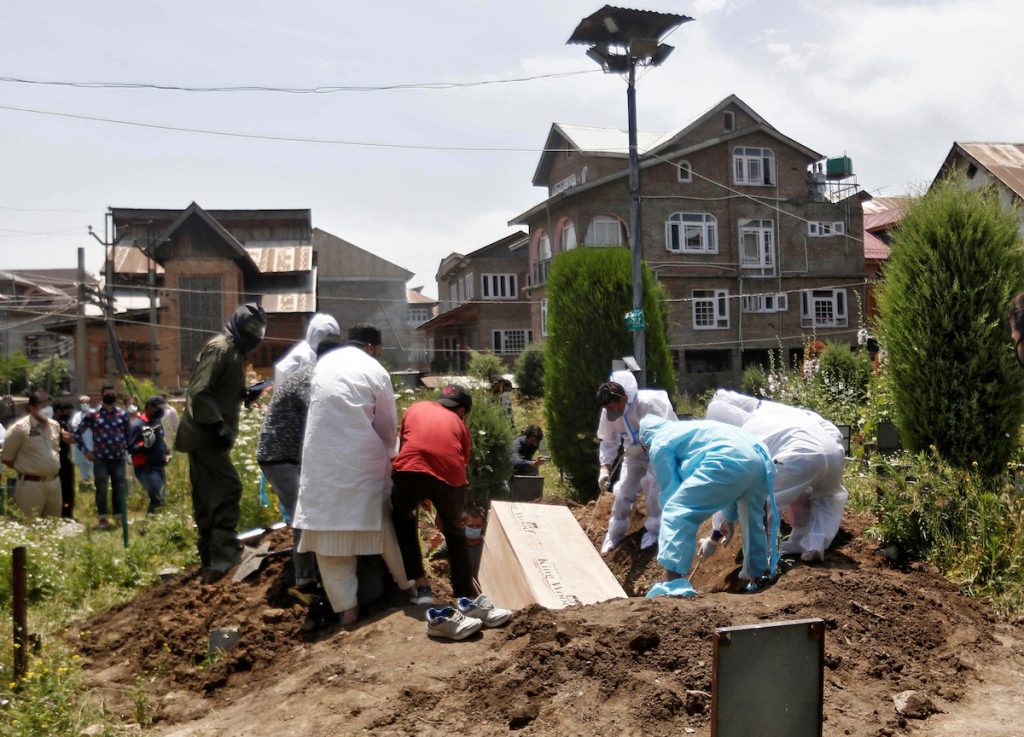Tajender Gill has been working as a gravedigger at Mumbai’s Sewri Christian cemetery for the past 10 years but he’s now too fearful to do his job properly.
“I have buried hundreds of people but due to the pandemic I will not bury a person who has died from the new coronavirus,” Gill told LiCAS.news. “I have my family and kids. What if something happens to me?” he said.
Even if cemetery management threatened to fire him, Gill said he wouldn’t budge.
“We usually charge 800 rupees ($10) per grave. I have been offered more than 20,000 rupees ($300) to bury a man who died of COVID-19. I straight away refused,” he said. “I will never touch the body of a person who was infected with COVID-19.”
Gill is not the only grave digger refusing to bury bodies of infected persons. Fear and anxiety are across the board of his trade.
Raju Sahni, who works at a Catholic cemetery in the capital of New Delhi, shared similar reservations as Gill has — he will only bury a dead person as long as they didn’t die of COVID-19.
“I am an illiterate man. I don’t know much about what is going on, but I will not at any cost put my life at risk,” Sahni said. “Money comes second, your health comes first,” he said.
The situation has left many Catholic cemeteries in India in a situation where bereaving families are struggling to bury a loved one who died from COVID-19 which has claimed the lives of over 16,800 people in India as of June 30.
Last month Cyril Dhara from Mumbai lost a relative to the disease. He said the Catholics in the city have faced immense hardships in trying to bury their loved ones who died due to coronavirus.
Dhara said he knew of at least 12 occasions at Sewri cemetery where a burial had been refused because the dead person died of the virus.
“I went to the government and complained about it,” Dhara said. “The government issued a conditional approval, telling us that the bodies should be cremated, and then the ashes should be buried,” he said. “I then registered a case with the police and only then only was my relative’s body allowed to be buried here.”
But still the cemetery’s gravediggers refused to bury the deceased.
“They asked us to get gravediggers from outside. I had to get a digger from a far-off village and I had to pay him a hefty sum for the task,” said Dhara.

Sechen Sangale, a Mumbai-based Catholic, had a harrowing experience when burying his father who died due to COVID-19 in a hospital, June 24. After the hospital gave the body to the family it was taken to a Christian cemetery.
“The gatekeepers at the cemetery at first didn’t allow us to enter. They said the cemetery doesn’t allow the burial of virus-infected persons. I had to fight with the graveyard management and somehow we were given some space,” Sangale said.
Once in the cemetery though, the grave diggers did not want to help.
“They were not even ready to touch it, let alone burying it with proper procedure. Finally, we had to seek help from the hospital staff who brought my father to the graveyard in an ambulance,” Sangale said
“But the hospital staff demanded 20,000 rupees ($300) for the burial and also protective equipment. We agreed to their demands, we had to. There was no option. Under a normal situation, the burial charges are a mere 800 rupees ($10),” he said.
Rita Massi, whose mother died last week due to the new coronavirus, faced a similar ordeal. Massi said she had to seek help from a Muslim friend who arranged the gravedigger for the family.
“I don’t know why these people aren’t counseled at this crucial stage. I was with my mother until she died. I used to comb her hair and change her clothes. I didn’t get infected,” Massi said. “How could they fear that they could die if they bury a COVID infected person?”
Reverend Samuel Christudoss, a senior member of Sewri Christian Cemetery management, said that they are helpless in addressing the issue. “If workers aren’t willing to bury the infected persons, we cannot force them,” he said.
Shilpa Roy, a senior Indian lawyer and activist, said that if there was scientific data indicating that corpses of people who died COVID-19 patients carry the virus, then the gravediggers’ measures would be reasonable, but with no scientific proof, such fear or panic based reasoning is not justified.
“People dying from COVID-19 shouldn’t be stigmatized. They should be sent to the heavenly abode with honor,” she said.






